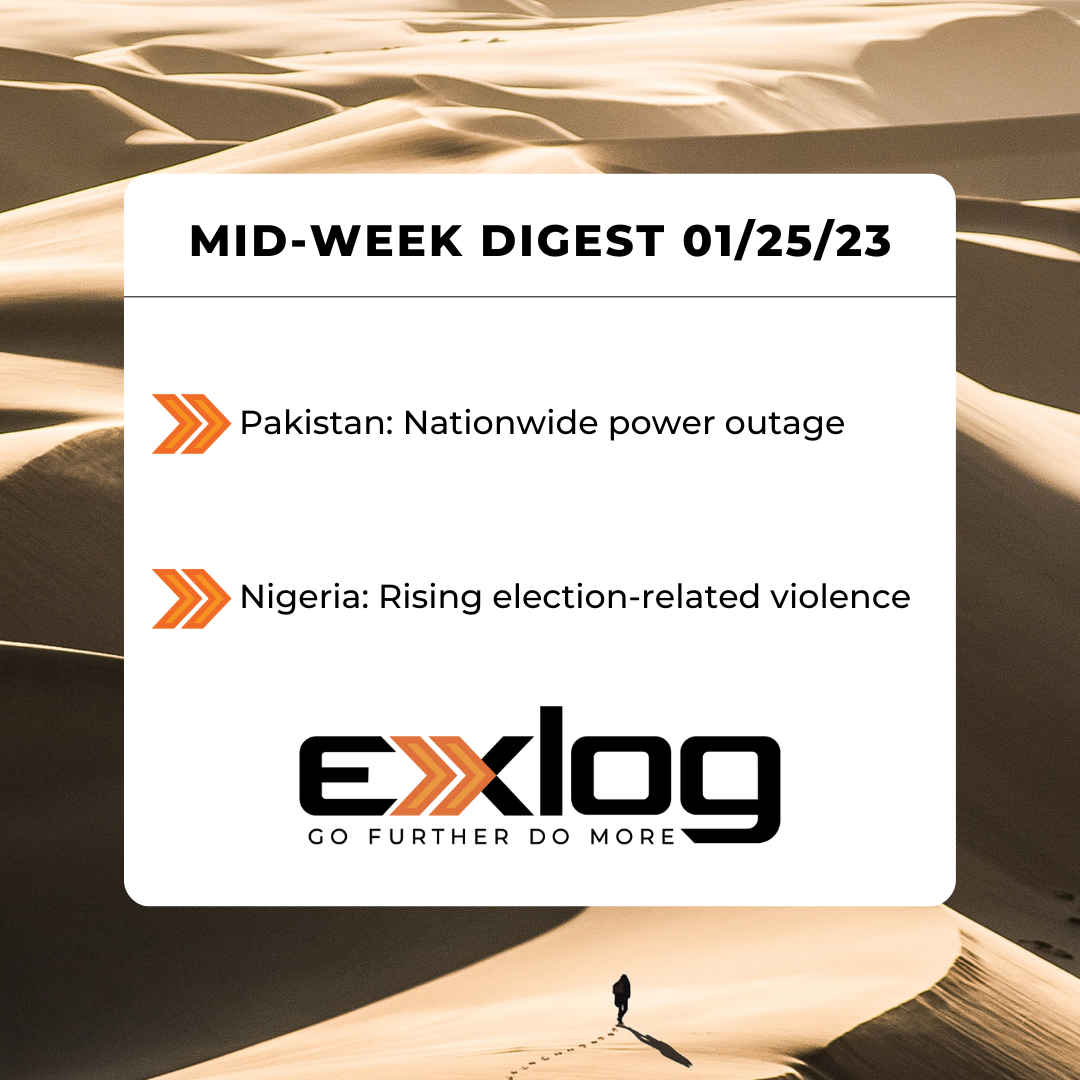Nationwide power outage in Pakistan and rising election-related violence in Nigeria
Pakistan: Nationwide blackout highlights power grid fragility
A power outage triggered by a voltage fluctuation in southern Sindh Province swept across Pakistan on Jan. 23, leaving more than 220 million people without electricity for nearly 24 hours and significantly disrupting operations in the manufacturing sector. The breakdown impacted major urban centers – including Islamabad, Karachi, Lahore, Peshawar, and Quetta – as well as numerous smaller cities and towns, forcing medical facilities, government offices, schools, and airports to rely on emergency generators. Operations of rapid transit trains in Lahore and certain other public transportation services were briefly suspended; however, air travel was uninterrupted, and major airports continued to operate normally. The textile industry – which comprises roughly 65% of Pakistan’s merchandise exports and accounts for 45% of the country’s employed labor force – suffered significant losses. Individual factories reported more than PKR 20 million (USD 87,000) in losses in one day of suspended production, indicating that the financial impact across the industry is likely in the billions of rupees. Internet and telecommunications services also experienced intermittent outages across the country. According to Pakistan’s energy minister, power was fully restored on Jan. 24, although brief outages are likely in the coming days as coal and nuclear plants are estimated to take up to 72 hours to restart. While electricity blackouts are common throughout the country due to outdated power transmission infrastructure, the Jan. 23 breakdown was the longest outage in recent years and marked the second such incident since October 2022 when major cities like Karachi, Quetta, and Hyderabad lost power for 12 hours due to power line issues. Investment in the power network has lagged amid ongoing negotiations over a bailout between the Pakistani government and the International Monetary Fund (IMF). While the government’s response to the recent outage was relatively swift, the frequency and scale of blackouts are likely to increase in the medium-to-long term in the absence of adequate funding in the energy sector. Both local and foreign businesses operating in the country will likely face significant operational disruptions without appropriate mitigation such as large-capacity backup generators and access to authorized satellite communication systems.
Nigeria: Political violence worsening one month before elections
The security environment in Nigeria is likely to further deteriorate in the short term ahead of general elections planned for Feb. 25, as demonstrated by the increase in violent attacks targeting party members – as well as staff and facilities of the Independent National Electoral Commission (INEC) – since the start of the campaign period on Sept. 28, 2022. Elevated levels of violence in the months preceding elections are not a new trend in the country; according to a global think tank monitoring political violence in Nigeria, at least 350 people were killed in election-related violence, and 51 others (mostly INEC officials) were kidnapped between 2014 and 2022. The majority of the attacks against the INEC recorded since 2019 have been concentrated in the southeastern region, with Imo state witnessing the largest number of incidents. While no group has claimed responsibility for the attacks, local authorities have attributed the incidents to the Indigenous People of Biafra (IPOB) – a nationalist separatist organization operating in Nigeria’s South East – and IPOB-allied armed groups. According to a non-governmental organization tracking Nigeria’s elections, attacks against the INEC and its staff have decreased in frequency since 2020. However, the perpetrators’ tactics have become more sophisticated, as illustrated by a complex attack involving gunfire and explosives targeting the INEC headquarters in Imo on Dec. 12, 2022. Growing insecurity ahead of the elections could prompt the government to postpone the vote, although the head of the INEC said on Jan. 17 that the commission was adequately prepared to facilitate voting. The government’s inability to deter election-related violence could depress voter turnout, exacerbate existing feelings of marginalization among vulnerable communities, and even fuel recruitment by the separatist movement. Politically-motivated violence and unrest associated with the vote could also further destabilize the country – which faces numerous security concerns linked to communal violence and banditry in central and northwestern regions and Islamic extremism in the North East – complicating the already challenging operational environment in the medium-to-long term.


